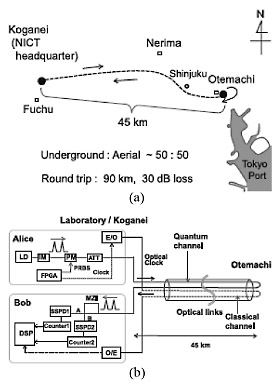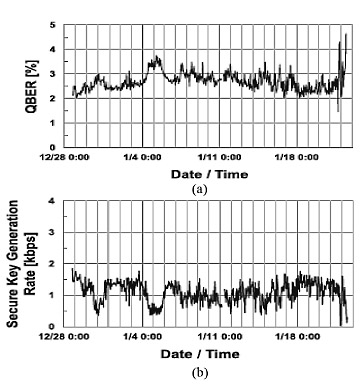Long-Term Performance of Quantum Key Distribution over 90-km Optical Links Installed in a Field Environment of Tokyo Metropolitan Area
The long-term operation performance, robustness and feasibility, of a
differential phase shift (DPS) quantum key distribution (QKD) system to
provide a long-distance key distribution service over optical fiber networks
was examined by a series of field experiments that were carried out using
a test-bed optical network in the Tokyo metropolitan area: Tokyo QKD network
(Fig. 1) [1]. In spite of a 30-dB transmission loss and 90-km propagation
along an optical link installed in a field environment, the stable generation
of a secure key was demonstrated for 25 days in a completely free-run operation
with a 1-GHz clock DPS-QKD system employing a weak coherent light pulse
and superconducting single photon detectors (SSPDs) [2]. The average sifted
key generation rate and the quantum bit error rate (QBER) were 11 kbps
and 2.6 % (Fig. 2(a)), respectively. The average generation rate of secure
key after error correction and privacy amplification was 1.1 kbps with
a fluctuation of ±0.5 kbps (Fig. 2(b)). Here, we defined the secure key
as the final key which was proven to be secure against general individual
attacks.
A comparison with meteorological data revealed the way in which the field environment influenced the key distribution performance. The secure key generation was considerably stable unless a strong wind disturbed the optical link which was composed of both aerial and underground regions with the approximately same total length. With the current system, some imperfections in photonic devices still limited the achievable performance levels, for example, the temporal bit error deterioration and the finite operation period. Some technical solutions were also provided to cope with these remaining problems.
This work was carried out in fruitful collaboration with the National Institute of Information and Communications Technology (NICT).
- [1]
- M. Sasaki et.al., Opt. Express 19 (2011) 10387.
- [2]
- K. Shimizu, T. Honjo, M. Fujiwara, T. Ito, K. Tamaki, S. Miki, T. Yamashita, H. Terai, Z. Wang, and M. Sasaki, J. Lightwave Technol. 32 (2014) 141.
 |
 |
|
|